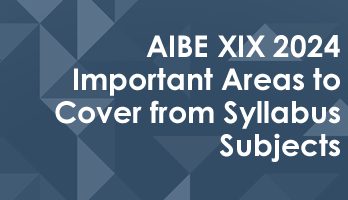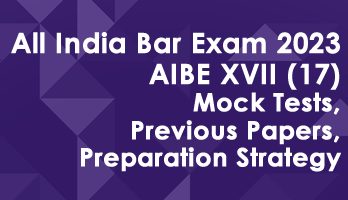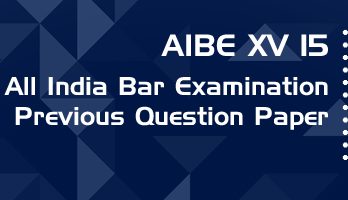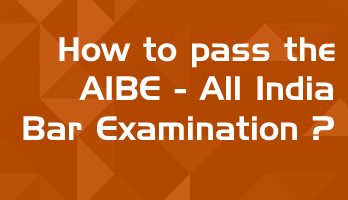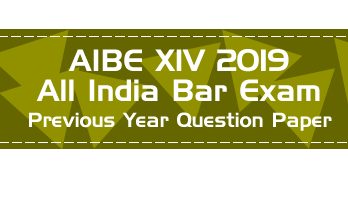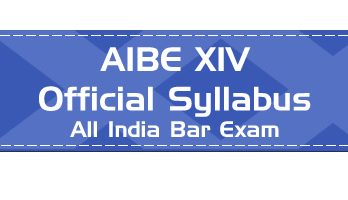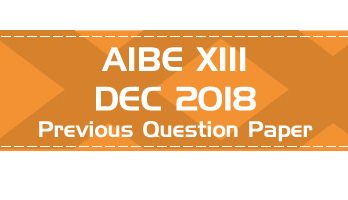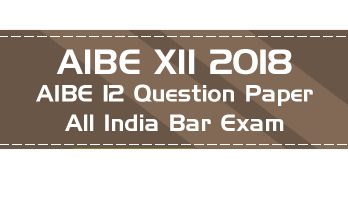In July 2010, then Chairman of the Bar Council of India, Mr. Gopal Subramanium had kicked off an overhaul of the Legal Education in India.
Apart from reviewing the processes of starting and running Law Colleges in India, a standardized qualifying exam called the ‘All India Bar Examination’ or AIBE was also introduced.
- Updated as per the latest AIBE Syllabus & Pattern
- 15 AIBE Previous Question papers - AIBE IV to XVIII
- 15 Full-length mock tests as per latest pattern
- All Questions with Answers and Explanations
- Access valid for one year from date of purchase
- Accessible 24 x 7 via Smart-Phone, Tablets and Desktops
- Free Sample Mock Test - Try Before You Buy
Authentic Feedback from previous LawMint users :
I got AIR 21 in CLAT PG. Thank you so much. Your mocks helped me a lot in my preparation 🙂 - Ayushi Jain
I have subscribed to your CLAT PG program and got AIR 36 in this year CLAT PG. I have also secured AIR 54 in AILET PG exam. I would like to thank you. Your mock paper really helps a lot - Shrashank Tripathi
I would like to thank you for the CLAT PG LLM COURSE. Practising mock tests there helped me in getting confidence and hence I was able to get AIR 45 in CLAT PG LLM - Akshay Awasthi
A year back, I relied on the IIT Kharagpur RGSOIPL mock test series by LawMint to prepare for my RGSOIPL entrance test. Few months back, I relied on your UGC NET Law series to prepare for UGC NET. I was the topper of the RGSOIPL entrance, and have cracked JRF in UGC NET. All thanks to LawMint - Anshuman Sahoo
"I got AIR 18 in CLAT PG and General Category rank 28 in AILET PG. I want to thank you for helping me practice well in controlled conditions from any place. It gave me a lot of confidence and I took the tests while travelling too. I also made it to IIT Kharagpur." - Vinodharani
"Lawmint has been of great help to me in securing AIR 25 in AILET PG and AIR 29 in CLAT PG examinations. The subjective and objective approach of the test series kept me up to date with the latest exam pattern." - Bhawna Nanda
"I, Nimmy Saira Zachariah joined you clat test series. I cleared AILET PG with 30th rank. Your test series were of immense help as it gave me clear idea of where my preparations stand thank you once again law mint." - Nimmy S Z
"Hey guys. Where do I start? If I thought that getting AIR 59 in Clat PG was it, then how wrong I was. With Lawmint now I have cracked UGC NET as well." - Joyanta Chakraborty
AIBE sought to ensure that all new Lawyers graduating during or after the academic year 2009-10 would be certified as possessing the minimum required knowledge of the various legal topics, essential to practice as an Advocate in India.
While there have been issues with the way the exam has been conducted and even the validity of the exam itself has been questioned in PILs, the exam by itself serves a significantly useful purpose.
LLB in India can be a five year integrated course pursued after 10+2 (e.g. B Com, LLB or BA, LLB) or it can be a three year course pursued after graduation. Over the three or five years, students study around 30 – 35 different subjects or areas of Law.
For example, in many Universities, Family Law is a part of the first year syllabus. Which would mean that once a student has cleared the exams, he or she would not have an opportunity to revise or refresh Family Law during the rest of the course. We can surmise that a typical Law student who has just completed the final year of his five year LLB course would be typically rusty on the topics covered in the early years of his course.
The aim of the AIBE – All India Bar Exam is to cover all the important and critical areas of Law from across the three or five year syllabus, ensuring that the newly minted Advocate at least has the fundamental knowledge to be able to take up the profession as an independent legal practitioner.
Since it is an open book, multiple choice type exam; memorising all the laws and rules is not critical.
But the ability to understand the question about law and knowing how look into the bare acts to find the answers is critical.
By preparing for the AIBE, students will refresh their knowledge of almost all the major topics from across their LLB course.
Given that there are literally thousands of Law colleges across India churning out thousands of Law graduates every year, the AIBE tries to weed out any students who don’t even understand the fundamentals of various laws, but somehow managed to clear their LLB exams. A sort of ‘final filter’ if you can call it that.
Another beneficial aspect is that the AIBE prep also helps students to prepare for LLM or PG entrance tests and also for various Judicial Services exams.
The concept of a Bar Exam is also not unique to India. Most of the developed and many developing countries across the world have a ‘Bar Exam’.
In some countries, the entry into a law course itself is through a tough entrance process, so that only academically competent students get into Law colleges.
In Japan and some other countries, there is no requirement for a person to have a prior law degree to appear for the Bar Exam and become a Lawyer. But the Bar Exam itself is an extensive multi-day affair with both objective and essay type questions, with a higher degree of difficulty.
When the AIBE was introduced in 2010, there were a number of questions and apprehensions within the community of Law Students and new advocates. So a ‘Letter to Students’ was published by Mr. Gopal Subramanium, which sought to address a number of these concerns. The letter is reproduced below.
Though there have been subsequent changes and newer notifications about the AIBE, this letter gives a good overview of BCIs long term vision on overhauling Legal education in India and the thoughts behind the AIBE.
Letter to Law Students
July 1, 2010
Dear young graduates and law students,
I am writing to you to share my thoughts and, as its Chairman, to explain the decisions of the Bar Council of India over the past few months.
We are at the cusp of great change in the profession of law and the system of delivering justice in India. As a student of law in India, you are also about to enter into a profession that continues to be an influential seat of society and carries with it the identity of a noble and learned profession.
However, there is also a clear realization that our legal profession finds itself sorely lacking in various areas. It is the direction we choose now that will determine the role the legal profession will play in the years to come.
On June 2, 2010, the Hon’ble Union Minister for Law and Justice released the Vision Statement for the Bar Council of India, in which the requirement for immediate action was laid down in the following words:
On the one hand we face a prosperous future as a country with a growing economy and the aspirations of a billion Indians unleashed upon the world. On the other we see massive inequities, shortfalls in education/health/infrastructure, delivery of justice and various other ills moving at a similar pace.
In such a scenario, the need for a stronger, more robust and ethically driven legal profession in India cannot be overemphasised.
In that document, we introspected and identified the various challenges that we collectively face as a profession today. There are three in particular, those related to the legal education in the country, that I wish to focus on:
1. Inadequate quality of legal education and infrastructure;
2. Lack of relevant skills training to meet the ever-changing demands of the modern world;
3. Lack of entry point and continuous assessment mechanisms to ensure the continuous growth and improvement of the legal profession.
The solutions to these three problems that the Bar Council has placed on the highest priority, embraced the following actions:
1. Raising the quality of the bar through entry-level assessment and continuous education and training;
2. Creating clear quality standards for curriculum, legal education and a common entry level standard for entering law schools across the country;
3. Creation of synergies between law schools across India to provide world-class legal education.
It is in light of the above, that the first step has been taken to put in place the All India Bar Examination – an entry-level assessment to the profession.
The decision to conduct an All India Bar Examination has not been taken quickly or without contemplation. In an order dated June 29, 2009, the Supreme Court noted the low standards of legal education and constituted a three-member committee to address the issue of affiliation of colleges. The former Chairman of the Bar Council of India, the former President of the Supreme Court Bar Association and myself, were the members of the three-member committee.
This report of the three-member Committee on Reform of Legal Education recommended the introduction of a bar examination for the purpose of admitting law graduates to the bar as well as the formation of the National Legal Knowledge Council to oversee future reform on legal education.
The Bar Council of India then passed Resolution No. 73/2010 at its meeting held on April 30, 2010 framing rules to conduct the All India Bar Examination.
I am aware that many of you are anxious about the introduction of the All India Bar Examination and have various questions, queries and opinions on the same. What I will request your co-operation and understanding on is the fact that this is a step in much needed broader ranging reform and also that this is step that involves a multitude of students facing different challenges, economic situations and professional choices. Therefore, taking a unitary point of view has been an available option for the Bar Council of India.
That having been said, the intention of the Bar Council of India is to be completely transparent and constructive about the All India Bar Examination. All the details of the All India Bar Examination have been posted on the website of the Bar Council of India from June 2, 2010, along with over fifty FAQs (frequently asked questions).
These FAQs will also be translated into multiple languages. In addition we have received and responded to over 200 queries on barexam@barcouncilofindia.org, and are continuously monitoring queries and making required changes.
To remove any further doubts, I will also outline below, some of the salient features of the All India Bar Examination.
1. The All India Bar Examination will be held on December 5, 2010. This date was decided upon keeping in mind the interests of students of 913 law colleges in India. Most of these law students would graduate around July-August and apply for enrolment. This would ordinarily take a few weeks (we are also reaching out to all the State Bar Councils to ensure expediency).
Since graduates can apply for the All India Bar Examination only after enrolling with the respective State Bar Council, it was necessary to keep the registration open till September 30, 2010 so that everyone has an opportunity to be able to attempt and clear the All India Bar Examination. Further, since advocates who apply by the last date would receive preparatory materials by the first week of October, 2010, they would still have 8 weeks to prepare for the All India Bar Examination.
This timeline (which has been taken on record by the Hon’ble Supreme Court of India in Bar Council of India v. Bonnie Foi Law College & Ors., SLP (c) No.22337/2008) was put in place to ensure that there is no first mover advantage and that law students have an equal opportunity to undertake the All India Bar Examination.
2. The All India Bar Examination is a mechanism to test the basic skills that an advocate would necessarily need in order to practice law in India. The areas that advocates will be tested in are not new areas but are the same areas that you have learnt in law school.
The intention of the All India Bar Examination is not to set an artificial standard but to set a basic standard for entry into the legal profession in India.
3. Any law student who has graduated in Academic Year 2009-10 (i.e., finally graduated in 2010) needs to appear for the All India Bar Examination and clear it in order to practice law in India.
It was necessary to start at some point in light of the immediate requirement for reform and necessary to avoid retrospective action. Hence the Bar Council of India decided to make the All India Bar Examination mandatory moving forward.
4. An advocate would have to apply for the All India Bar Examination by collecting an application form from any State Bar Council, filling up the same across directly to the Bar Council of India. Registration for the examination will be open from July 15, 2010 till September 30, 2010.
Law students who are applying for enrollment after July 15, 2010 are advised to collect the application form for the All India Bar Examination at the same time as they collect the enrollment form.
5. The application form will contain complete instructions and will be available at every State Bar Council from July 15, 2010 onwards. A short one pager setting out sample instructions on the application form will also be available to be collected at each State Bar Council.
A more detailed presentation on the FAQs (charting out the most frequently asked questions and their responses) will also be available on the Bar Council of India website.
We are also trying to get an online application process in place before July 15, 2010 to provide further flexibility to all law students. Further, lists of any incomplete or incorrectly filled forms by advocates will also be put on the Bar Council of India website during the registration period.
6. An advocate would have to pay Rs.1,300/-*** (Rupees One thousand Three hundred only) as a fee to appear for the All-India Bar Examination, which amount will include the cost of receiving preparatory materials.
7. Keeping in mind the fact that there are various students across India who undergo their legal education in multiple languages, the All India Bar Examination will be conducted in nine languages.
Advocates may choose to appear for the examination in any of the following nine languages: Hindi, Telugu, Tamil, Kannada, Marathi, Bengali, Gujarati, Oriya, or English. Preparatory Materials will be provided in the same language that the advocate chooses to appear for the All India Bar Examination.
8. There are two categories of subjects that the All India Bar Examination will test. These subjects are included in the subjects prescribed for study for the three-year and five-year Ll.B. programmes at law schools in India (as set out under Schedule I to the Bar Council of India Rules).
These areas are critical for anyone beginning the practice of law. Further details of these subjects are available on the website of the Bar Council of India.
9. Preparatory Materials on each of the above subjects (in any of the above languages) would be
sent across to every advocate post registration for the All India Bar Examination.
Since these Preparatory Materials are being created to ensure easy access and learning with a focus on core principles and application of the same, they would be helpful for any law student looking to enter and excel in the Indian legal profession.
10. The All India Bar Examination will be conducted through multiple-choice questions (i.e. correct answer would have to be chosen out of five options) on the above legal subjects. The Examination will also be “open book”. Advocates will be free to bring in any materials they choose.
The intent is to gauge application of legal principles as opposed to rote learning.
11. There is no percentage or percentile ranking. Merely ‘pass’ or ‘fail’ results will be released.
This is an entry-level assessment test and not a competitive exam – clearing the All India Bar Examination will provide a level playing field for students from any law school across the country.
12. The All India Bar Examination will be conducted at over 25 venues across India – in major cities in most states of India. A full list of all the venues will be provided in the application form.
13. Stringent invigilation and security processes are being put in place to ensure that the All India Bar Examination provides a secure manner of assessment.
14. Upon successfully clearing the All India Bar Examination, an advocate will be permitted to practice law in India and will receive a “Certificate of Practice” from the Bar Council of India.
It is possible that you will still have several questions about the All India Bar Examination. Please browse the Frequently Asked Questions at www.barcouncilofindia.org.
If you have any further questions, please write to us with your questions to barexam@barcouncilofindia.org and we would be happy to put in place any required changes. Do understand that your feedback is also extremely critical for the success of this venture.
As a senior member of the legal profession in India, I strongly feel that the All India Bar Examination is the right step and importantly will be good for each and every one of you in the long run.
I look forward to our support and co-operation in the many steps that we will take together to return the Indian legal profession to its rightful stature.
Thank you and good luck
- Updated as per the latest AIBE Syllabus & Pattern
- 15 AIBE Previous Question papers - AIBE IV to XVIII
- 15 Full-length mock tests as per latest pattern
- All Questions with Answers and Explanations
- Access valid for one year from date of purchase
- Accessible 24 x 7 via Smart-Phone, Tablets and Desktops
- Free Sample Mock Test - Try Before You Buy
Authentic Feedback from previous LawMint users :
I got AIR 21 in CLAT PG. Thank you so much. Your mocks helped me a lot in my preparation 🙂 - Ayushi Jain
I have subscribed to your CLAT PG program and got AIR 36 in this year CLAT PG. I have also secured AIR 54 in AILET PG exam. I would like to thank you. Your mock paper really helps a lot - Shrashank Tripathi
I would like to thank you for the CLAT PG LLM COURSE. Practising mock tests there helped me in getting confidence and hence I was able to get AIR 45 in CLAT PG LLM - Akshay Awasthi
A year back, I relied on the IIT Kharagpur RGSOIPL mock test series by LawMint to prepare for my RGSOIPL entrance test. Few months back, I relied on your UGC NET Law series to prepare for UGC NET. I was the topper of the RGSOIPL entrance, and have cracked JRF in UGC NET. All thanks to LawMint - Anshuman Sahoo
"I got AIR 18 in CLAT PG and General Category rank 28 in AILET PG. I want to thank you for helping me practice well in controlled conditions from any place. It gave me a lot of confidence and I took the tests while travelling too. I also made it to IIT Kharagpur." - Vinodharani
"Lawmint has been of great help to me in securing AIR 25 in AILET PG and AIR 29 in CLAT PG examinations. The subjective and objective approach of the test series kept me up to date with the latest exam pattern." - Bhawna Nanda
"I, Nimmy Saira Zachariah joined you clat test series. I cleared AILET PG with 30th rank. Your test series were of immense help as it gave me clear idea of where my preparations stand thank you once again law mint." - Nimmy S Z
"Hey guys. Where do I start? If I thought that getting AIR 59 in Clat PG was it, then how wrong I was. With Lawmint now I have cracked UGC NET as well." - Joyanta Chakraborty
Note: The above notification is only for informational and historical background on the All India Bar Exam.
*** Over the past few years, BCI had revised the fee structure and stopped providing any ‘official’ preparatory material for the AIBE.
Refer to the latest notifications for information about the upcoming AIBE editions.
Your comments and feedback are welcome.
Note : Always refer to the current year’s official advertisement at http://www.allindiabarexamination.com for the latest details.


